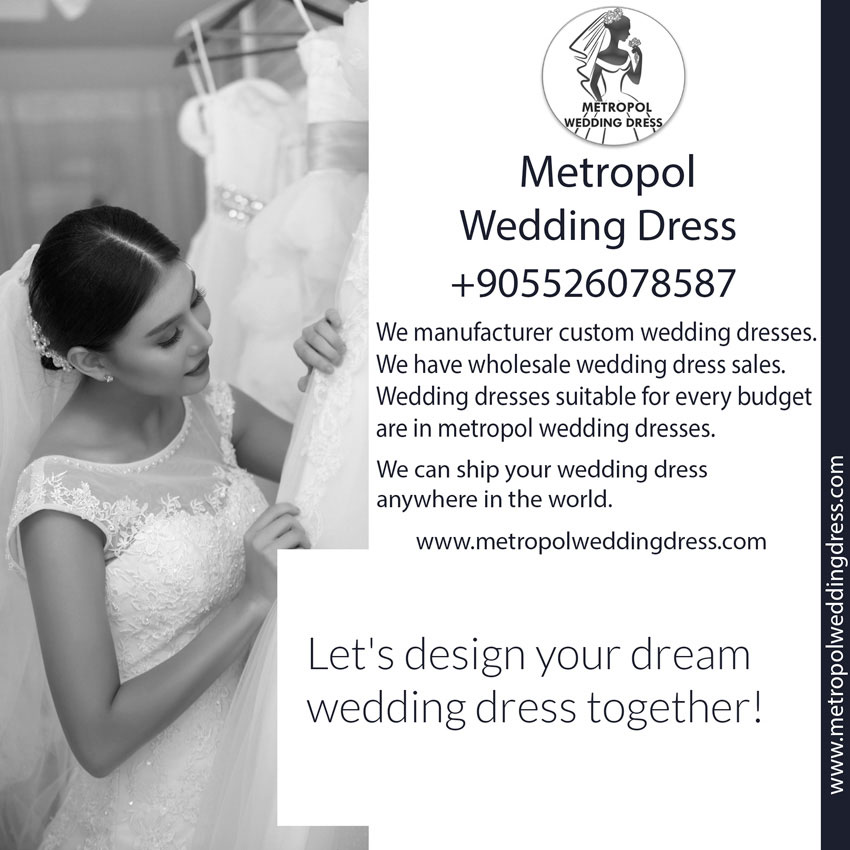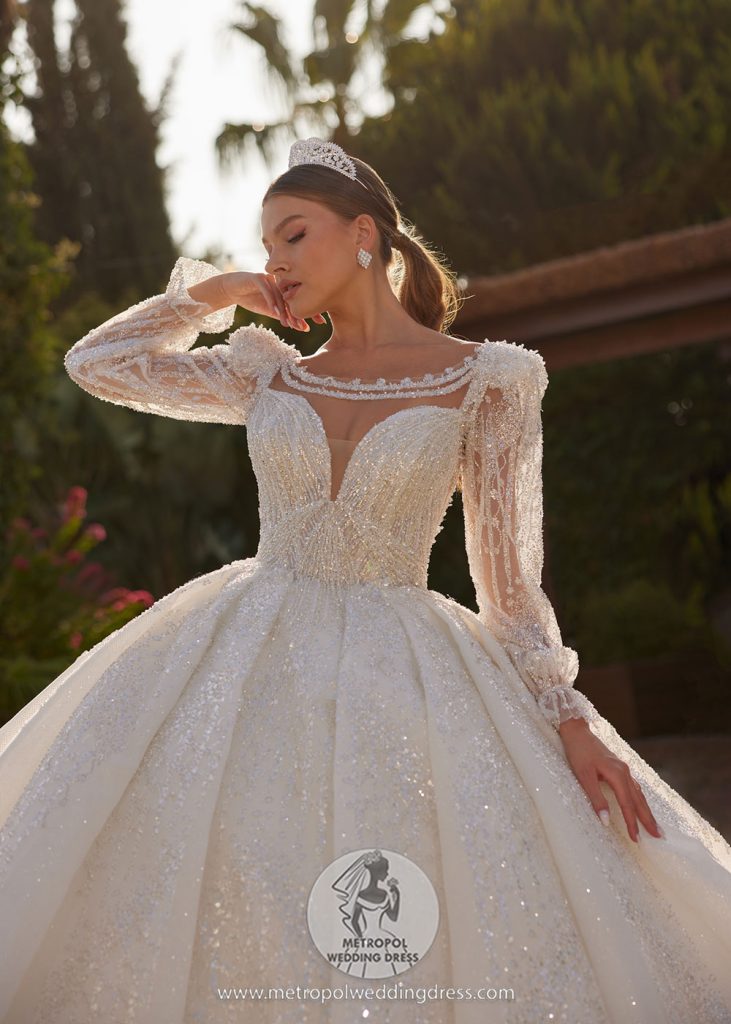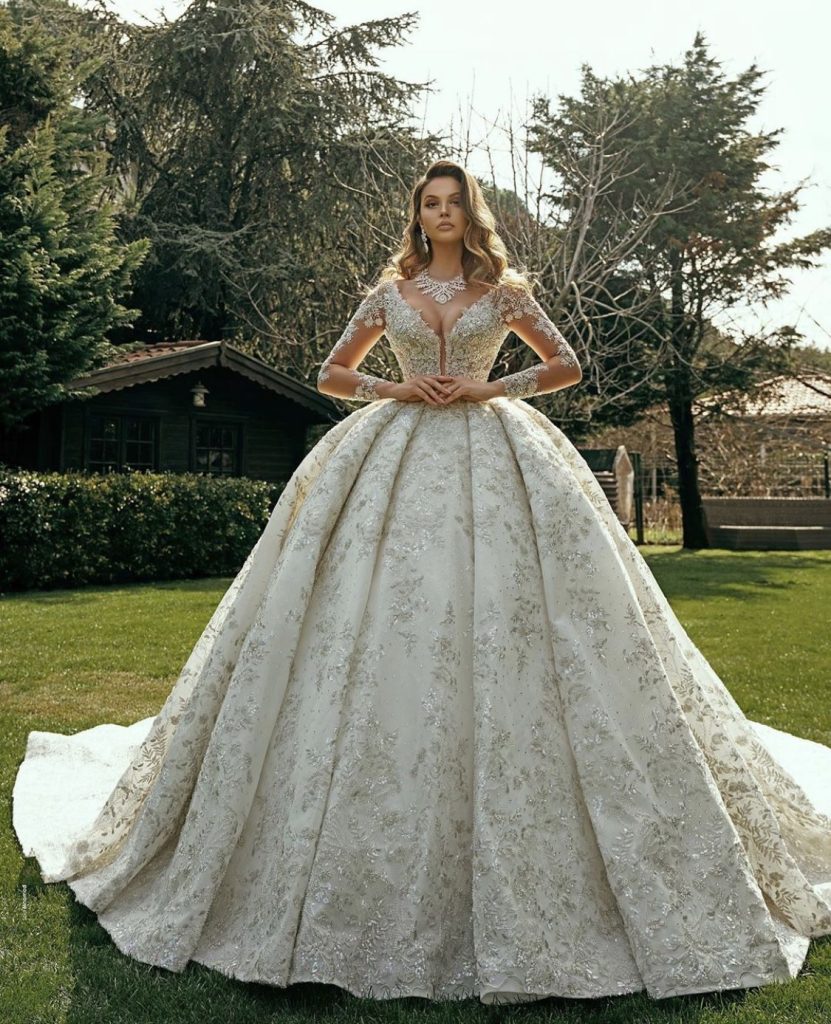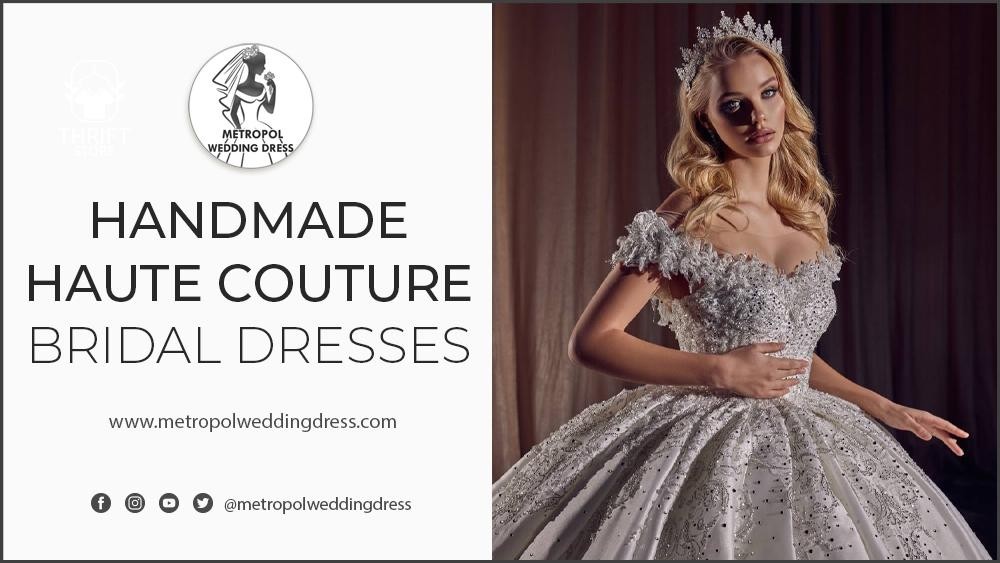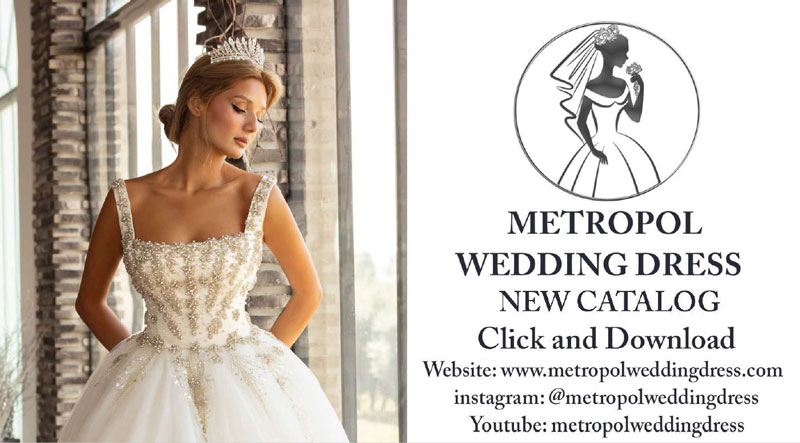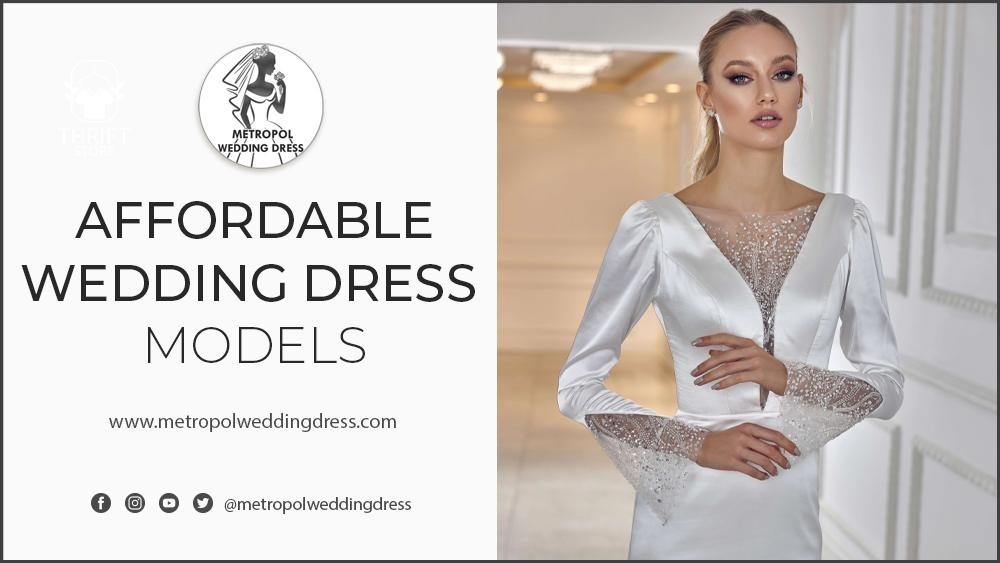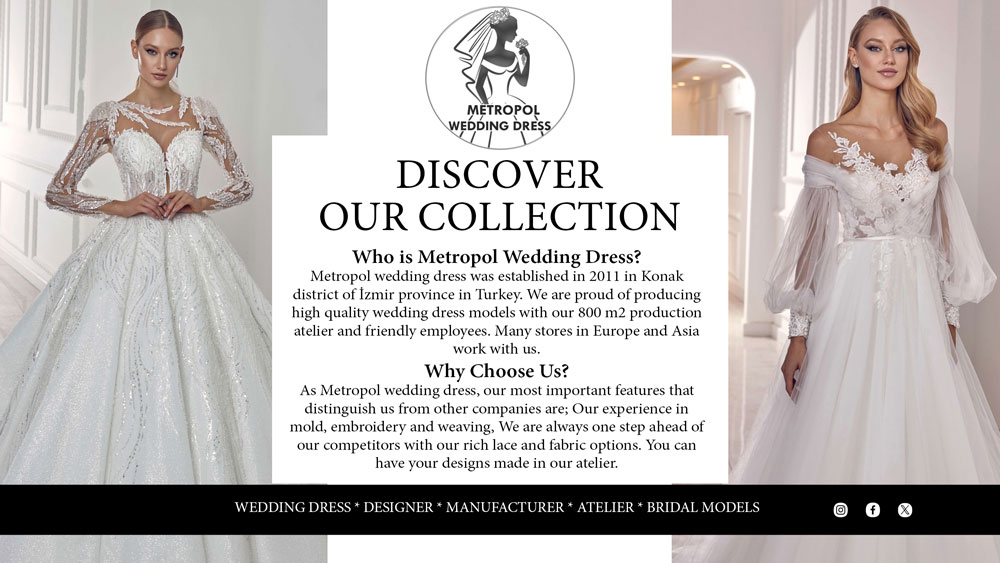
Wedding Dresses from Manufacturers refer to bridal gowns produced by a company or business entity that specializes in creating and supplying wedding dresses. These manufacturers work closely with designers, tailors, and other industry professionals to bring the vision of a wedding gown to life. They are responsible for overseeing the entire process, from the initial design concept to the final production and delivery of the dresses.
The significance of wedding dresses lies in their symbolic representation of a bride’s transition from singlehood to marriage. These gowns often become cherished heirlooms passed down through generations, reflecting the bride’s personality, style, and the theme of her wedding.
Manufacturers play a crucial role in the wedding industry by producing high-quality, fashionable, and affordable wedding dresses. They ensure that the dresses meet the desired standards of quality and design, striking a balance between style and functionality to cater to the diverse needs of brides worldwide.
In summary, Wedding Dresses from Manufacturer represent the combined efforts of designers, tailors, and industry professionals who work together to create beautiful, high-quality bridal gowns for brides on their special day. These manufacturers contribute to the ever-evolving landscape of the wedding industry, providing a wide range of options for brides to choose from and helping to make their dream weddings a reality.
Wedding dress shopping is an exciting and memorable experience for every bride-to-be. Choosing the perfect dress that makes you feel beautiful and confident on your special day is a top priority. One way to ensure you find the dress of your dreams is by considering purchasing directly from a wedding dress manufacturer.
Buying directly from a wedding dress manufacturer has several advantages. Firstly, it offers a wider selection of dresses to choose from. Manufacturers usually have a larger inventory compared to individual bridal boutiques. This means you have a better chance of finding a dress that matches your style and preferences perfectly.
Another advantage of buying from a manufacturer is the potential cost savings. When purchasing directly, you eliminate the middleman and avoid the additional markup that often comes with boutique prices. This means you can get a high-quality wedding dress at a more affordable price.

Quality is another important factor to consider when buying a wedding dress. Manufacturers are usually committed to producing dresses of exceptional quality. They have strict quality control measures in place to ensure that every gown meets their standards. By purchasing directly from a manufacturer, you can have peace of mind knowing that your dress is made with skill and attention to detail.
Buying directly from a wedding dress manufacturer also allows for customization options. Most manufacturers offer some degree of customization, allowing you to personalize certain aspects of your dress. Whether it’s adding sleeves, adjusting the neckline, or changing the length, customization gives you the opportunity to create a dress that truly reflects your vision.
To find a wedding dress manufacturer, start by doing thorough research. Look for manufacturers that specialize in wedding dresses and have a positive reputation. Check for reviews and testimonials from previous customers to gain insights into the quality of their dresses and customer service.
Visit the manufacturer’s website or contact them directly to inquire about their inventory and customization options. It’s essential to communicate your preferences and requirements clearly to ensure they can accommodate your needs.
Before finalizing your purchase, consider visiting the manufacturer’s showroom or requesting fabric samples to get a better idea of the dress’s quality and appearance. This will help you make an informed decision and ensure that the dress meets your expectations.
In conclusion, buying your wedding dress directly from a manufacturer offers a range of benefits such as a wider selection, potential cost savings, high-quality craftsmanship, and customization options. Take the time to research and communicate with different manufacturers to find the perfect dress that will make your wedding day even more special.
Wedding Dresses From Manufacturers: Benefits, Process, and Tips
Choosing a wedding dress is one of the most important decisions a bride-to-be will make. From the fabric, to the style, to the fit, every detail is vital in creating the perfect dress for your special day. One way to ensure you find the dress of your dreams is by considering purchasing directly from a wedding dress manufacturer. This article will explore the benefits of buying from a manufacturer, the process involved, and tips for finding the right manufacturer for you.
Part 1: Benefits of Buying from a Wedding Dress Manufacturer
Wider Selection
When you purchase a wedding dress from a manufacturer, you have access to a much wider selection of dresses than you would if you only shopped at bridal boutiques. Because manufacturers produce dresses in large quantities, they have a larger inventory and more styles to choose from. This means you have a better chance of finding the dress that matches your style and preferences perfectly.
Better Prices
Buying directly from a wedding dress manufacturer can save you money. With no middlemen in the process, you avoid paying the additional markup that often comes with boutique prices. You also have the opportunity to negotiate prices, as manufacturers usually have more flexibility with their prices than retailers.
High-Quality Craftsmanship
Wedding dress manufacturers are committed to producing dresses of exceptional quality. They have strict quality control measures in place to ensure every gown meets their standards. By purchasing directly from a manufacturer, you can have peace of mind knowing that your dress is made with skill and attention to detail.
Customization Options
Most wedding dress manufacturers offer some degree of customization, allowing you to personalize certain aspects of your dress. Whether it’s adding sleeves, adjusting the neckline, or changing the length, customization gives you the opportunity to create a dress that truly reflects your vision.
Part 2: The Process of Buying from a Wedding Dress Manufacturer
The first step in buying a wedding dress from a manufacturer is to do thorough research. Look for manufacturers that specialize in wedding dresses and have a positive reputation. Check for reviews and testimonials from previous customers to gain insight into the quality of their dresses and customer service.
Once you have done your research, choose a manufacturer that best fits your needs. Consider their location, selection, customization options, and price range.
Visit the manufacturer’s website or contact them directly to inquire about their inventory and customization options. It’s essential to communicate your preferences and requirements clearly to ensure they can accommodate your needs.
Before finalizing your purchase, consider visiting the manufacturer’s showroom or requesting fabric samples to get a better idea of the dress’s quality and appearance. This will help you make an informed decision and ensure that the dress meets your expectations.
Once you have chosen your dress and any customization options, place your order with the manufacturer. Be sure to clarify all details, including the delivery date, price, and any additional fees.
After your order is complete, your dress will be shipped to you. Be sure to double-check the dress upon arrival to ensure that it matches the specifications you provided.
Part 3: Tips for Buying from a Wedding Dress Manufacturer
Buying a wedding dress from a manufacturer can take longer than buying from a boutique, as there is often a longer processing time. It’s important to start your research and order process early to ensure that your dress arrives on time.
When communicating with the manufacturer, be clear about your preferences and requirements. This will help ensure that the dress meets your expectations and avoid any misunderstandings.
While buying from a manufacturer can be more cost-effective than buying from a boutique, it’s still important to consider your budget. Be sure to clarify the price and any additional fees with the manufacturer before placing your order.
Check for references and reviews from previous customers to gain insight into the manufacturer’s quality and customer service. This can help you make a more informed decision when choosing a manufacturer.
While it’s important to have a clear idea of what you want in a wedding dress, it’s also important to keep an open mind. Manufacturers may have unique styles and customization options that you haven’t considered, so it’s worth exploring all of your options.
Buying a wedding dress from a manufacturer can offer a range of benefits, including a wider selection, potential cost savings, high-quality craftsmanship, and customization options.
By following the process outlined above and considering these tips, you can find the perfect dress for your special day. Remember to start early, be clear about your preferences, consider your budget, check for references and reviews, and keep an open mind.
Wedding Dress From Manufacturers to Brides
Abstract: The wedding dress industry is a multifaceted domain encompassing manufacturers, designers, retailers, and brides.
This comprehensive analysis delves into the intricate world of wedding dress manufacturing, exploring the key players, processes, economic dynamics, and emotional journeys involved.
From the creation of exquisite gowns in manufacturing facilities to their transformative role in the lives of brides, this article offers a deep dive into every aspect of the wedding dress industry.
- Introduction
- Setting the Stage: The significance of wedding dresses in various cultures and societies.
- Scope of the Analysis: Overview of the journey from manufacturing to the moment a bride walks down the aisle.
- Evolution of the Wedding Dress Industry
- Historical Overview: Tracing the evolution of wedding dress manufacturing from ancient traditions to modern practices.
- Technological Advancements: Impact of technology on design, production, and distribution processes.
- Key Players in Wedding Dress Manufacturing
- Manufacturers: Overview of major manufacturers and their roles in the supply chain.
- Designers: Profiles of influential wedding dress designers shaping industry trends.
- Fabric Suppliers: Importance of quality fabrics and sourcing considerations.
- The Manufacturing Process
- Fabric Selection: Factors influencing fabric choice and quality standards.
- Design and Development: From initial sketches to prototype creation and final production.
- Production Techniques: Sewing, embellishment, and assembly processes explained.
- Quality Control: Ensuring consistency and perfection in every gown.
- Global Manufacturing Hubs
- China: Dominance of Chinese manufacturing and its impact on the industry.
- Europe: Legacy of European craftsmanship in luxury bridal wear.
- Emerging Markets: Rise of manufacturing hubs in countries like India, Turkey, and Vietnam.
- Economics of Wedding Dress Manufacturing
- Cost Structures: Breakdown of manufacturing costs and profit margins.
- Pricing Strategies: Factors influencing pricing decisions and market positioning.
- Market Trends: Shifts in consumer preferences, including the rise of sustainable and affordable options.
- Supply Chain Dynamics
- Material Sourcing: Global supply chains for fabrics, embellishments, and accessories.
- Production Logistics: Challenges and strategies in managing production timelines and logistics.
- Sustainability Initiatives: Efforts to reduce environmental impact throughout the supply chain.
- Bridal Boutique Experience
- Retail Landscape: Overview of bridal boutique models, from traditional stores to online platforms.
- Customer Journey: Emotional aspects of finding the perfect dress and the role of bridal consultants.
- Customization and Alterations: Tailoring dresses to fit individual preferences and body types.
- Cultural and Social Significance
- Symbolism of Wedding Dresses: Cultural meanings and traditions associated with bridal attire.
- Societal Trends: Reflection of societal values and norms in wedding dress choices.
- Inclusivity and Diversity: Efforts to promote diversity and representation in the bridal industry.
- Conclusion
- Recap of key insights into the wedding dress industry.
- Reflections on the enduring appeal and evolving nature of bridal fashion.
- Future Outlook: Anticipated trends and challenges shaping the industry’s trajectory.
This comprehensive analysis offers a panoramic view of the wedding dress industry, shedding light on its complexities, challenges, and profound cultural significance.
From the bustling manufacturing hubs to the intimate bridal boutiques, every facet of this captivating world is explored, providing valuable insights for industry professionals and brides alike.
Wedding Dresses from Manufacturer refer to bridal gowns produced by a company or business entity with the identification number.
This manufacturer specializes in creating and supplying wedding dresses, working closely with designers, tailors, and other industry professionals to bring the vision of a wedding gown to life.
In this extended description, I will discuss the role of manufacturers in the wedding industry, the process involved in creating wedding dresses, the importance of quality and design, and the impact of Manufacturer on the wedding dress market.
- Role of Manufacturers in the Wedding Industry:
Manufacturers play a pivotal role in the wedding industry by producing high-quality, fashionable, and affordable wedding dresses. They are responsible for overseeing the entire process, from the initial design concept to the final production and delivery of the dresses.
By working closely with designers, tailors, and other industry professionals, manufacturers ensure that the dresses meet the desired standards of quality and design.
Manufacturers also keep up with current fashion trends and adapt their designs to cater to the evolving preferences of brides worldwide. They often collaborate with other businesses in the wedding industry, such as photographers, florists, and event planners, to create cohesive and memorable wedding experiences for their customers.
- Process of Creating Wedding Dresses:
The process of creating a wedding dress typically involves several stages:
a. Design Conceptualization: Designers brainstorm ideas and create sketches of the proposed gowns. They consider factors such as current fashion trends, the bride’s personal preferences, and the overall theme of the wedding.
b. Fabric Selection: Manufacturers choose appropriate fabrics based on the design and the bride’s requirements. The choice of fabric can significantly impact the dress’s texture, weight, and overall appearance.
c. Pattern Making: A tailor creates a pattern based on the designer’s sketch, ensuring that the final gown will fit the bride perfectly. This step is crucial, as it sets the foundation for the entire dress production.
d. Cutting and Sewing: The fabric is cut according to the pattern, and the pieces are sewn together. This process requires precision and attention to detail to ensure the final product is flawless.
e. Embellishments and Accessories: Manufacturers add any additional details such as lace, beads, or embroidery to enhance the gown’s appearance. They may also incorporate accessories like veils, belts, or shoes to complete the bridal ensemble.
f. Quality Control and Packaging: Before shipping, the wedding dresses undergo a thorough quality control check to ensure they meet the desired standards. They are then carefully packaged to protect them during transit.
- Importance of Quality and Design:
Quality and design are essential factors when it comes to wedding dresses. A well-crafted gown not only looks stunning but also ensures the bride feels comfortable and confident on her wedding day.
Manufacturers must strike a balance between style and functionality, ensuring the dress is both fashionable and practical for the bride to wear throughout the event.
Design plays a significant role in setting a manufacturer apart from its competitors. Unique and innovative designs can attract a broader customer base and establish the manufacturer as a leader in the wedding dress industry.
- Impact of Manufacturer:
Manufacturer, as a wedding dress producer, contributes to the ever-evolving landscape of the wedding industry. By offering high-quality, stylish, and affordable wedding gowns, they cater to the diverse needs of brides worldwide. Their designs may reflect current fashion trends or incorporate traditional elements, depending on the preferences of their clientele.
Moreover, Manufacturer may collaborate with other businesses in the wedding industry, such as photographers, florists, and event planners, to create cohesive and memorable wedding experiences for their customers. By working together, these professionals can help make a bride’s dream wedding a reality.
In conclusion, wedding dresses from Manufacturer represent the culmination of a meticulous process involving design, fabric selection, pattern making, sewing, and quality control.
The manufacturer’s role in creating these gowns is vital, as it ensures brides can find the perfect dress for their special day. As a key player in the wedding industry, Manufacturer contributes to the ever-changing landscape of bridal fashion and helps make countless weddings unforgettable.
Wedding Dresses From Manufacturer: Benefits, Process, and Tips
Choosing the perfect wedding dress is a significant part of preparing for your special day. One option to consider is purchasing your wedding dress directly from a manufacturer. This article will explore the benefits, process, and tips for buying a wedding dress from a manufacturer.
Part 1: Benefits of Buying from a Manufacturer
Wedding dress manufacturers usually have a wide variety of styles, designs, and sizes to choose from. They have a larger inventory compared to individual bridal boutiques, giving you a better chance of finding the dress that matches your vision and preferences.
When you buy directly from a manufacturer, you eliminate the middleman, which can result in cost savings. Bridal boutiques often mark up the price of dresses, but purchasing directly from a manufacturer allows you to get a high-quality dress at a more affordable price.
Most wedding dress manufacturers offer customization options, allowing you to tailor the dress to your personal style. Whether you want to add sleeves, change the neckline, or modify the length of the dress, manufacturers can accommodate your requests and create a dress that reflects your unique taste.
Manufacturers are committed to producing wedding dresses of exceptional quality. They have experienced designers and seamstresses who adhere to strict quality control measures. Buying from a manufacturer ensures that your dress is made with skill and attention to detail.
Part 2: The Process of Buying from a Manufacturer
Start by researching different wedding dress manufacturers. Look for manufacturers with a good reputation, positive customer reviews, and a wide selection of dresses. Take note of their customization options and pricing to find the best fit for you.
Once you have a few potential manufacturers in mind, reach out to them for more information. You can visit their website or contact them directly to inquire about their process, available inventory, customization options, and pricing. Clear communication is key in ensuring that the manufacturer can meet your specific requirements.
If you are satisfied with the information provided by the manufacturer, schedule a consultation or measurement appointment. This can be done in person or remotely, depending on the manufacturer’s process. During this step, you will discuss your preferences, go over specific design details, and possibly provide your measurements.
Once you have finalized the design, customization options, and measurements, you will place your order with the manufacturer. They will provide you with the total cost, payment options, and any necessary terms and conditions. Make sure to review everything thoroughly and clarify any questions before proceeding with the payment.
After your order is confirmed and payment is made, the manufacturer will begin the dress production process. The time frame for this will vary depending on the manufacturer and the complexity of the dress. Once the dress is ready, it will be delivered to you. Schedule fittings to ensure that the dress fits perfectly and make any necessary alterations if required.
Part 3: Tips for Buying from a Manufacturer
Buying directly from a manufacturer may take longer than purchasing from a boutique. It is advisable to start the process early to allow enough time for consultations, design adjustments, dress production, and fittings.
Carefully read and understand the terms and conditions provided by the manufacturer regarding payment, cancellation, alterations, and delivery. Clarify any doubts or concerns before placing your order to prevent any issues later on.
Thoroughly communicate your preferences, customization requests, and measurements to the manufacturer. Provide reference images or sketches if necessary. Clear communication ensures that the manufacturer understands your vision and can deliver the dress you desire.
While it is important to communicate your preferences, it is also essential to trust the expertise of the manufacturer. They have vast experience in creating wedding dresses and can provide valuable suggestions and guidance based on your preferences.
Buying a wedding dress directly from a manufacturer offers benefits such as a wide variety of options, cost savings, customization options, and high-quality craftsmanship.
Remember to research different manufacturers, communicate clearly, understand the process and terms, and start early to ensure a smooth and successful experience. With careful consideration and proper planning, you can find the perfect wedding dress that will make you feel beautiful and confident on your special day.
Wedding dresses from a manufacturer are bridal gowns produced by a company or business entity with an identification number. In this article, I will discuss the significance of wedding dresses, the role of manufacturers, and the process involved in creating these gowns.
Additionally, I will touch on the impact of this particular manufacturer on the wedding industry, as well as the importance of quality and design.
I will discuss the significance of
wedding dresses, including their importance in the transition from single woman to married one and their role as cherished heirlooms.
The dress is a visual representation of the bride’s personality, style, and the wedding theme. It is a significant aspect of the bride’s appearance on her big day, reflecting her individuality and paying tribute to the traditions and customs of her culture.
The role of manufacturers:
Manufacturers are a vital part of the wedding industry as they produce high-quality, fashionable, and affordable wedding dresses.
They collaborate closely with designers, tailors, and other industry professionals to bring the vision of a wedding gown to life.
Manufacturers oversee the entire process, from the initial design concept to the final production and delivery of the dresses.
The process of creating wedding dresses:
The creation of a wedding dress usually involves several stages.
Firstly, designers brainstorm ideas and create sketches of the proposed gowns, taking into account factors such as current fashion trends, the bride’s personal preferences, and the overall theme of the wedding.
Secondly, manufacturers select appropriate fabrics based on the design and the bride’s requirements. The selection of fabric can greatly affect the texture, weight, and overall appearance of the dress.
A tailor creates a pattern based on the designer’s sketch to ensure a perfect fit for the bride. This step is crucial as it sets the foundation for the entire dress production. The fabric is then cut according to the pattern, and the pieces are sewn together. This process requires precision and attention to detail to ensure the final product is flawless.
They may also incorporate accessories like veils, belts, or shoes to complete the bridal ensemble. Quality control and packaging are also important steps in the process.
Prior to shipment, the wedding dresses undergo a meticulous quality control check to ensure they meet the desired standards. Subsequently, they are carefully packaged to safeguard them during transit.
Quality and design are critical factors in creating the perfect wedding dress. A well-crafted gown not only looks stunning but also ensures the bride feels comfortable and confident on her big day. Manufacturers must strike a balance between style and functionality, ensuring the dress is both fashionable and practical for the bride to wear throughout the event.
Design plays a significant role in setting a manufacturer apart from its competitors, and a confident approach to design can help a manufacturer stand out in the market. Unique and innovative designs can broaden the customer base and establish the manufacturer as a leader in the wedding dress industry.
the manufacturer contributes significantly to the ever-evolving landscape of the wedding industry. By offering high-quality, stylish, and affordable wedding gowns, they confidently cater to the diverse needs of brides worldwide. Manufacturers design wedding dresses that reflect current fashion trends or incorporate traditional elements, depending on the preferences of their clientele.
They collaborate with other businesses in the wedding industry, such as photographers, florists, and event planners, to create cohesive and memorable wedding experiences for their customers. By working together, these professionals can help make a bride’s dream wedding a reality.
In conclusion, Manufacturer’s wedding dresses are meticulously crafted through a process that involves design, fabric selection, pattern making, sewing, and quality control. The manufacturer plays a vital role in creating these gowns, ensuring that brides can find the perfect dress for their special day. As a key player in the wedding industry, Manufacturer contributes significantly to the ever-changing landscape of bridal fashion and helps make countless weddings unforgettable.
Bridal gown production companies
Title: Exploring Bridal Gown Production Companies: Crafting Dreams Into Reality
- Bridal gown production companies play a pivotal role in the wedding industry, transforming visions into tangible masterpieces.
- This article delves into the world of bridal gown production companies, exploring their processes, craftsmanship, and contributions to the bridal fashion landscape.
- The Essence of Bridal Gown Production Companies:
- Definition and Scope: An overview of what bridal gown production companies entail and their significance in the wedding fashion industry.
- Mission and Vision: Discuss the goals and aspirations of these companies, including their commitment to quality, design innovation, and customer satisfaction.
- Crafting the Perfect Gown:
- Design Conceptualization: The initial stages of gown creation, from brainstorming ideas to sketching designs that capture the essence of the bride’s vision.
- Fabric Selection: The importance of choosing high-quality fabrics that enhance the design and comfort of the gown, considering factors like texture, drape, and embellishments.
- Pattern Making and Draping: Techniques used to translate design concepts into tangible patterns and prototypes, ensuring proper fit and structural integrity.
- Sewing and Assembly: The labor-intensive process of sewing together fabric pieces, adding embellishments, and meticulously crafting each detail of the gown.
- Collaborations and Partnerships:
- Designer Collaborations: Partnerships between bridal gown production companies and renowned designers to create exclusive collections that embody the latest trends and styles.
- Fabric Suppliers and Manufacturers: The role of fabric suppliers and manufacturers in providing high-quality materials that meet the standards of bridal gown production companies.
- Technology and Innovation:
- CAD/CAM Technology: The integration of computer-aided design and manufacturing technologies to streamline the design process, improve accuracy, and enhance productivity.
- 3D Printing: The use of 3D printing technology to create intricate embellishments, accessories, and even entire gown components with precision and efficiency.
- Virtual Try-On: Innovative virtual try-on platforms that allow brides to visualize themselves in different gown styles and make informed purchasing decisions.
- Quality Assurance and Standards:
- Quality Control Processes: Rigorous quality control measures implemented by bridal gown production companies to ensure that each gown meets the highest standards of craftsmanship and excellence.
- Compliance and Certification: Adherence to industry regulations and certifications that validate the authenticity, safety, and ethical practices of bridal gown production companies.
- Global Impact and Market Reach:
- International Distribution: The global reach of bridal gown production companies, with distribution channels spanning across various countries and continents.
- Market Segmentation: Targeting diverse market segments and consumer demographics, including luxury brides, budget-conscious brides, and destination wedding enthusiasts.
- Sustainable Practices and Ethical Considerations:
- Eco-Friendly Materials: The adoption of sustainable and environmentally friendly materials in gown production, such as organic fabrics, recycled fibers, and biodegradable embellishments.
- Ethical Labor Practices: Commitment to fair labor practices, including safe working conditions, fair wages, and respect for the rights of workers throughout the supply chain.
- Future Trends and Innovations:
- Customization and Personalization: The growing demand for customized and personalized gown options that reflect the unique preferences and personalities of brides.
- Digital Transformation: Continued advancements in digital technologies and e-commerce platforms that enhance the online shopping experience for brides and streamline gown production processes.
Conclusion:
- Bridal gown production companies are the unsung heroes behind the exquisite gowns that grace wedding ceremonies worldwide.
- By embracing innovation, craftsmanship, and ethical practices, these companies continue to shape the future of bridal fashion and make dreams come true for brides around the globe.
International wedding dress suppliers
International wedding dress suppliers are companies or entities that provide wedding dresses to customers across different countries and regions. These suppliers typically have a global presence and offer a wide range of wedding dress styles to cater to diverse cultural preferences and bridal trends. Here’s an elaboration on international wedding dress suppliers:
- Global Presence:
- International wedding dress suppliers operate on a global scale, with distribution channels spanning multiple countries and regions.
- They may have flagship stores, boutiques, or authorized retailers in key cities around the world, as well as an online presence to reach customers in remote areas.
- Diverse Selection:
- These suppliers offer a diverse selection of wedding dress styles to accommodate various cultural traditions, preferences, and body types.
- Their collections may include traditional and contemporary designs, ranging from classic ball gowns to modern mermaid silhouettes, and everything in between.
- Quality and Craftsmanship:
- International wedding dress suppliers prioritize quality and craftsmanship, sourcing premium materials and employing skilled artisans to create exquisite gowns.
- They often collaborate with renowned designers and manufacturers to ensure that their dresses meet the highest standards of excellence and reflect the latest trends in bridal fashion.
- Customization Options:
- Many international wedding dress suppliers offer customization options, allowing brides to personalize their gowns to suit their unique style preferences and wedding themes.
- Customization may include alterations to the neckline, sleeves, silhouette, and embellishments, as well as bespoke design services for one-of-a-kind creations.
- Customer Service:
- Customer service is a priority for international wedding dress suppliers, who strive to provide exceptional shopping experiences for brides around the world.
- This may include personalized styling consultations, virtual fittings, and responsive support via online chat, email, or phone to assist brides throughout the gown selection and purchasing process.
- Shipping and Logistics:
- International wedding dress suppliers manage complex shipping and logistics operations to ensure timely delivery of gowns to customers worldwide.
- They may partner with reputable shipping carriers and logistics providers to offer reliable shipping options, tracking services, and customs clearance assistance for international orders.
- Cultural Sensitivity:
- International wedding dress suppliers demonstrate cultural sensitivity and awareness, respecting diverse traditions, customs, and religious practices when serving customers from different cultural backgrounds.
- They may offer specialized collections or adaptations to accommodate specific cultural requirements, such as modesty preferences or traditional wedding attire.
Overall, international wedding dress suppliers play a crucial role in providing brides across the globe with access to an extensive selection of high-quality, beautifully crafted wedding dresses, ensuring that every bride finds her dream gown for her special day.
International wedding dress suppliers are businesses or companies that operate on a global scale, providing high-quality wedding gowns and bridal wear to customers worldwide. These suppliers often cater to a diverse range of preferences, styles, and budgets, ensuring that brides from different cultures and regions can find the perfect dress for their special day.
International wedding dress suppliers can be categorized into various types:
- Manufacturers: These companies specialize in producing wedding dresses in large quantities. They work closely with designers, tailors, and other industry professionals to create fashionable and affordable gowns that cater to the evolving preferences of brides globally.
- Wholesalers: Wholesale suppliers purchase wedding dresses in bulk from manufacturers and then sell them to retailers, boutiques, or directly to customers at a lower price. They often have an extensive inventory of various designs, styles, and sizes, making it easier for brides to find their dream gown.
- Distributors: Distributors act as the link between manufacturers and retailers. They handle the logistics, marketing, and sales of wedding dresses, ensuring that the products reach their target audience efficiently.
- Designer Brands: Some international wedding dress suppliers are designer brands that create unique and innovative wedding gowns. These brands often have a strong presence in the fashion industry and are known for their signature styles and high-quality craftsmanship.
- Online Retailers: With the rise of e-commerce, many international wedding dress suppliers have established their online presence. These retailers offer a wide range of wedding gowns and bridal wear, making it convenient for brides to browse and purchase their desired dresses from the comfort of their homes.
International wedding dress suppliers play a crucial role in the global wedding industry by providing brides with a diverse selection of wedding gowns that cater to their individual tastes and preferences. By collaborating with designers, tailors, and other industry professionals, these suppliers ensure that the gowns they offer are of the highest quality and meet the ever-changing demands of the modern bride.

